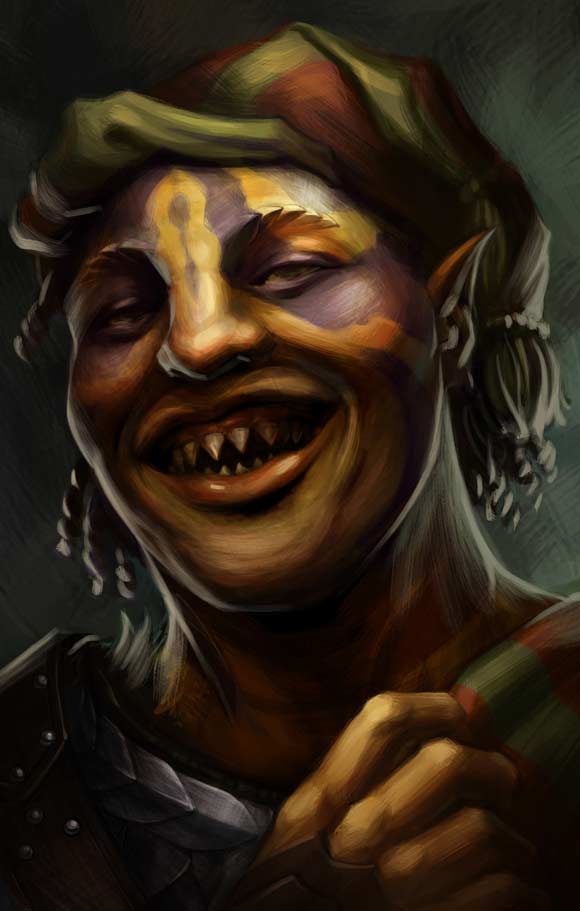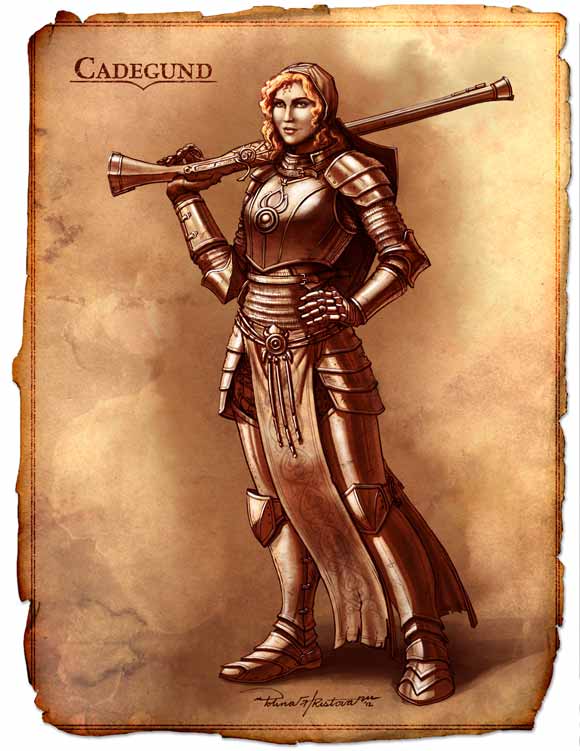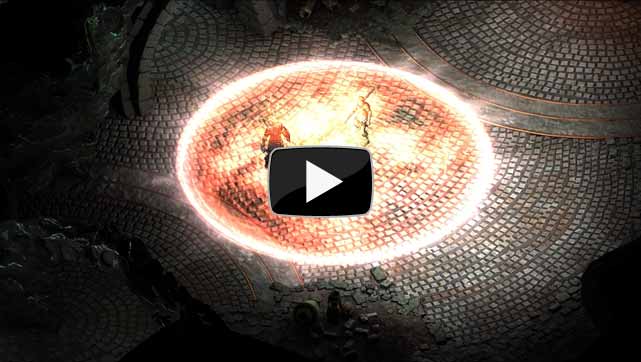Update by Josh Sawyer, Project Director
For our third class update, we will be covering chanters and priests. Along with paladins (covered in Update 56), these classes provide parties with their core support bonuses and healing effects. Different games refer to these types of characters using different terms -- usually "leader" or "support" -- but at their core, they excel when they are providing assistance to their teammates. The benefits they provide to the group often outstrip the contributions of individual party members in the final tally, but their abilities must be used carefully to maximize their impact.
Our next update will be from Adam Brennecke. He has some great graphical enhancements to share that we hope you'll enjoy. After that, our final class update will be on The Front Line: fighters and barbarians.
All three of the leader classes have a balanced suite of offensive abilities and though there is overlap in the effects of their various support abilities, they differ significantly in how they are used. Paladins utilize persistent auras to provide strong bonuses to allies in their immediate vicinity and limited-use single-target commands to grant powerful buffs to individual teammates. Chanters' phrases create a rotating cycle of bonuses that shift over the course of combat, building up energy until they can utter powerful invocations. Priests are traditional casters, relying on large area of effect bonuses mixed with small area offensive spells to direct combat from afar.

Kana Rua, a chanter.
Chanters are storytellers and repositories of ancient lore from myriad cultural traditions. They use these stories and legends to stir the memories of the dreaming lost souls and soul fragments that surround them. The spirits respond by creating magical effects, essentially playing their part in the recreation of the legends. In this way, chanters act as directors of supernatural actors playing out momentary plays for the chanter's benefit. Due to their heavy focus on folktales and storytelling, they have an inherent bonus to Lore. As explorers of many lost and forgotten vaults dating back to Eora's antiquity, chanters also have a bonus to Mechanics, helping them bypass tricky locks and traps.
To use their special kind of magic, chanters link together individual short phrases from different legends to create longer chants. The phrases have distinctive, thematically-appropriate effects that are of low power but can be applied while the chanter is engaged in other combat activities. As one phrase ends and another begins, the effects of the first phrase will linger, allowing multiple phrases to overlap with each other. Through the clever overlapping of phrases, chanters can grant their allies a sizable stack of minor bonuses.
But chanters aren't entirely about their passive phrases and chants. With each phrase that passes, chanters gain greater control over the spirits assisting them. When enough control is gained, chanters can direct them to perform a single powerful spell called an invocation. Invocations are often support-oriented, but some contain powerful offensive effects. Invocations are so powerful that they disrupt a chanter's chants, disabling their effects for several seconds until the chanter can recover.
While Eora's wizards are known for their "colorful" spell names, chanters' phrases are far more loquacious, often incorporating the entire spoken text of the phrase.
Sample chants:
- Blessed Was Wengridh, Quickest of His Tribe - Movement rate and Reflexes increased for allies in the area of effect.
- Thick Grew Their Tongues, Stumbling O'er Words - Enemy Concentration is reduced. (Will)
- The Fox from the Farmer Did Run and Leap - Enemy Disengagement Attacks have reduced Accuracy.
- The Silver Knights' Shields Broke Both Arrow and Blade - Increases the Deflection of allies in the area of effect.
- At the Sight of their Comrades, their Hearts Grew Bold - Increases the Fortitude and Will of allies in the area of effect.
Sample invocations:
- Not Felled by Axe, Nor Broken by Storm - Increases allied Slash and Shock Damage Threshold.
- If their Bones Sleep Still Under that Hill, None Can Say - Summons three skeletons.
- The Thunder Rolled like Waves on Black Seas - Stuns and pushes enemies in the area of effect. (Fortitude)
- The Lover Cried out to the Beloved, "I am Yours!" - Charm effect on all enemies in the area of effect. (Will)
- Rise Again, Rise Again, Scions of Adon! - Revives unconscious allies and heals a small amount of Stamina in a large area. This has no effect on characters who have already been Maimed or Killed in combat.
- The Brideman Slew Thirty 'Fore they Crossed Half the Hall - Increases the Might, Constitution, and Resolve of allies in the area of effect.
In addition to their chants and invocations, chanters' close association with the Lost gives them one final, passive power: Ancient Memory. This ability activates whenever the chanter is in combat and grants low-level Stamina regeneration to all nearby allies. It is not as strong as a fighter's Constant Recovery or a priest's Holy Radiance, but can affect even faraway allies at all times.

Cadegund, a priest.
Priests are devoted followers of one or more deities, though almost all have a primary dedication to a single god above all others. They are well-versed in philosophy, myths, and legends, giving them an inherent bonus to the Lore skill. Additionally, the requirements of their faith often involve traveling long distances in difficult circumstances, giving them an inherent bonus to Athletics.
In the world of Eora, priests do not gain power directly from their deity, but from their belief in the deity and the tenets of their religion. Paladins share a similar source of power, but differ from priests in the intensity and nuance of their beliefs. Paladins' faith is single-minded, extremely passionate, and held above all other concerns. The faith of priests is more philosophical, open to criticism (both their own and from others), and malleable from individual to individual. While paladins are ever-burning wellsprings of spiritual energy, priests gather energy into their own souls and release it through the use of specific prayers. These prayers form the common spells priests use in battle, ranging from healing magic and divine attacks to a variety of blessings and curses.
Compared to wizards, priests have access to a smaller number of spells overall but do not need to prepare those spells in a grimoire. And while priests do have offensive spells, they are smaller in area and generally weaker in power than similar effects available to wizards and druids. Here are a few:
- Restore Minor Stamina - Part of a series of progressively powerful Stamina-healing spells. Restores Stamina to all allies in the area.
- Armor of Faith - All allies in the area gain bonus Damage Threshold.
- Withdraw - Caster or ally is momentarily phased out (cannot act, cannot be targeted) and regenerates Stamina.
- Divine Terror - All enemies in the area are Frightened for the duration (Will).
- Consecrated Ground - Creates a long-lasting circle of Stamina regeneration on the ground for allies.
- Divine Mark - Blasts the target with Burn damage and reduces their Deflection for a short duration (Will).
- Holy Power - Allies' Might and Resolve are increased.
- Pillar of Faith - Does Crush damage to the target (Reflex) and knocks enemies Prone (Fortitude) in a small area (Foe Only).
- Prayer Against Restraint - Part of a series of spells that ward against afflictions. Grants a bonus to resist any attack containing the Hobbled or Stuck afflictions. If those afflictions are already on the target, their durations are reduced by 10 seconds (Hobbled) or 5 seconds (Stuck) respectively.
- Watchful Presence - All affected allies gain an effect on them that will last until the end of combat or until triggered. When any affected character drops below 20% Stamina, Watchful Presence will heal a significant amount of Stamina on the character.
- Triumph of the Crusaders - Allies gain a bonus that restores Stamina every time they defeat an opponent. The ally must strike the "finishing" blow to gain the benefit.
- Revive the Fallen - Revives and restores a modest amount of Stamina to unconscious allies in a small area. This has no effect on characters who have already been Maimed or Killed in combat.
- Salvation of Time - Extends the duration of all beneficial effects on allies.
- Crowns for the Faithful - Increases the Perception, Intellect, and Resolve of all allies in the area.
- Cleansing Flame - Hurls a ball of holy fire at an enemy. It does continuous Burn damage to the target and reduces the duration of beneficial effects (Reflex). After a few seconds, the Cleansing Flame leaps to another enemy within 3m and repeats the process again, ultimately affecting up to three targets. If no valid targets are in range when a leap occurs, the spell expires.

In addition to their spells, all priests have two inherent abilities: Interdiction and Holy Radiance. Interdiction is a fast-acting Dazed effect that the priest can apply to a group of enemies. It does not have a long duration, but can be valuable in gaining a quick advantage.
Holy Radiance regenerates Stamina for all allies in close proximity to the priest. Additionally, any vessels (spirits bound into unliving matter like dead flesh, copper, or bronze) hit by the effect take Burn damage and are Frightened if the radiance overcomes their Will.
The power of both Holy Radiance and the paladin's Faith and Conviction abilities can be modified by their behavior and the reputations they develop from the choices they make. When players make a paladin or priest character, they select an order or deity, respectively. Each choice highlights two types of behavior that are celebrated and two types of behavior that are condemned. For priests and paladins played as the main character, their Holy Radiance and Faith and Conviction power will shift based on their behavior. Reinforcing their deity's or order's preferred behavior will gradually increase their power, while playing against type will cause a small diminishment in their power. These changes are not dramatic, but reflect a measure of dissonance between the character's stated faith and how they choose to conduct themselves.

A few paladin orders:
- The Shieldbearers of St. Elcga - An order of Aedyran holy warriors who emphasize kindness and diplomacy over cruelty and aggression. The Shieldbearers were founded in honor of an elven noble who helped unite the Aedyr and Kulklin kingdoms after a long war.
- Kind Wayfarers - Knights-errant who assist troubled travelers and celebrate love, condemning deception and malice even when dealing with their enemies. The Kind Wayfarers are a diverse group of people and can be found all over the known world.
- Bleak Walkers - Soldiers dedicated to conducting warfare mercilessly and with extreme brutality in order to bring a swift end to conflicts. Known for their unyielding, terrible nature, most nobles will only call on them as a last resort.
Some of the deities priests can select:
- Eothas - Presumed dead by many, Eothas is (or was) the god of renewal and light. His followers exemplify honesty and benevolence in their interactions with others. In the Dyrwood, Eothasians are often victims of prejudice due to the aftermath of The Saint's War, in which the Eothasian peasant known as St. Waidwen led a holy war into Norwaech.
- Magran - A goddess of fire and warfare, Magran is celebrated by many Dyrwoodans for her priests' assistance in The Saint's War. Already known for their use of firearms, the priests collaborated to develop the "Godhammer" bomb that destroyed St. Waidwen at Evon Dewr Bridge. Statues of Magran can be found all over the Dyrwood and Magranites are popularly known for their boldness and quick wits.
- Berath - The god (or goddess) of the dead takes many forms in different cultures, but their names are widely invoked by most people at one time or another. Theologians see Berath as the guardian of all gateways, including the gates of life, death, and rebirth that all mortals must pass through. Common folk fear the priesthood of Berath but respect them for their level-headedness and unflinching resolve in the face of endless death and suffering.
The Leaders of the Band are a powerful trio of classes for players who choose to focus on bolstering their allies. Each class has its own style of providing benefits and we hope you enjoy experimenting with their varied mechanics.
That's all for this week. Let us know what you think of the chanter and priest in the forum. As always, thanks for reading.
